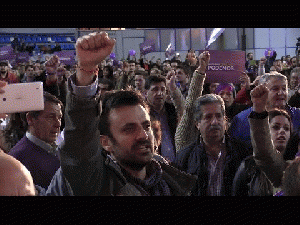Reprinted from Dispatches From The Edge
The effort by Pedro Sanchez, leader of the Spanish Socialist Workers Party, to form a government on March 2 brings to mind the story of the hunter who goes into the forest with one bullet in his rifle. Seeing a deer on his right and a boar on his left, he shoots in the middle.
Sanchez's search for a viable coalition partner began when the ruling right-wing Popular Party (PP) took a pounding in Spain's Dec. 20 election, dropping 63 seats and losing its majority. Voters, angered by years of savage austerity that drove poverty and unemployment rates to among the highest in Europe, voted PP Prime Minster Mariano Rajoy out and anti-austerity parties in, although leaving the PP as the largest single party in the parliament.
The only real winner in the election was the left-wing Podemos Party, which took 20.6 percent of the vote. The Socialist Party actually lost 20 seats, its worst showing ever, and at 22 percent, barely edged out Podemos. And if the Spanish political system were not rigged to give rural voters more power than urban ones, Podemos would have done much better. The Socialists and the PP are particularly strong in rural areas, while Podemos is strong in the cities.
While a candidate in Madrid needs 128,000 votes to be elected, in rural areas as few as 38,000 votes will get you into the parliament. Podemos and the Socialists both won over five million votes, with the difference only 341,000. But the Socialists took 89 seats to Podemos's 65.
Spaniards voted for change, but the Socialists, who ran an anti-austerity campaign, chose to form an alliance with the conservative Ciudadanos or Citizens Party, which refuses to have anything to do with Podemos -- and the feeling is mutual. Ciudadanos also underperformed at the polls. Ciudadanos was predicted to get as much as 25 percent of the vote and surpass Podemos, but instead came in under 14 percent with only 40 seats.
On the surface the only thing the Socialists and Ciudadanos have in common is their adamant opposition to Catalonia's push for a referendum on independence. Podemos is also opposed to a Catalan breakaway, but supports the right of the region to vote on the matter.
Catalonia's drive for independence is certainly controversial and would have a major impact on Spain's economy, but exactly how the Spanish government thinks it can block a referendum is not clear. And if Catalans did vote for independence, how would Madrid stop it? One doubts that the government would send in the army or that such an intervention would be successful.
Indeed, the fierceness with which the PP, Socialist Party and Ciudadanos oppose the right of Catalans to vote is more likely to drive the province toward independence, rather than discourage it. At this point Catalonia's voters are split slightly in favor of remaining in Spain, although young voters favor independence, a demographic factor that will loom larger in the future. In provincial elections last September, candidates who supported independence took 47.7 percent of the vote.
(Note: You can view every article as one long page if you sign up as an Advocate Member, or higher).






